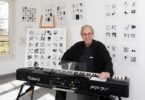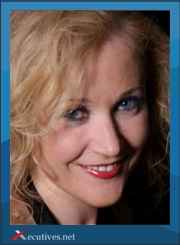
Nicki Parrott (c) Mary Jane Photography
Nicki Parrott, born in Australia, is part of a new music generation, specialised in Jazz and playing, among other instruments, the bass which brought her international attention and worldwide esteem. Very early in her career she studied with various music legends such as Ray Brown, John Clayton, Rufus Reid and worked for 10 years every monday night in New York with the guitar legend Les Paul. Les Paul also inspired several generations of Rock’n Roll guitar players, some of them superstars such as The Edge of U2, former Guns’N Roses guitarist Slash and Paul McCartney of the Beatles. In a terrific concert with Jazz legend Dick Hyman and his All-Stars this year in Bern, she also appeared as a singer and, together with her colleagues, inspired a cheering audience, inspired by improvisational genius. In her interview with Christian Dueblin, Nicki Parrott talks about her career, her love for Jazz, about music legend Les Paul, challenges in the music business, the significance of musical mentors for younger talents and she explains how Jazz is different from other music styles.
Dueblin: Ms. Parrott, as other famous Jazz musicians, such as our interview partner Hazy Osterwald who played several instruments professionally, your musical track record is also full of surprises. When you were a young girl, you started playing the flute followed by the piano and made it to concert level. Then, all of a sudden you took up the bass, the instrument that brought you a lot of esteem and highlights in your career. Could you tell us more about your musical path and the musical decisions you took as a talented child?
Nicki Parrott: People normally ask me and my sister Lisa Parrott, who is also a great musician and also lives in New York, if our parents were musicians (laughs). Then I say: No, they did not play an instrument, but they were very musical. They were real music fans and went to lots of gigs, collected music and listened to the radio all the time. So I grew up in a very musical house where music had its place and was a very respected subject. They bought a little beale upright piano when I was 4 years old. They actually bought it for themselves, but finally they did not go on with lessons. I started playing on that piano very early, mainly classical music. Australia is very big on classical music, like in UK and Europe, and lots of instruments are being played in school. I took piano lessons and later I also took up the flute. I developed a good ear over the years. To take up such an instrument as a child is like a child learning a new language. At six the brain is like a sponge, taking it all up in so short a time. I did all the exams at school playing the flute and the piano and would have become a classical musician.
Dueblin: When did your interest for Jazz awake?
Nicki Parrott: When I was about 14 my sister started bringing home Jazz records such as Louis Armstrong, Charlie Parker and Miles Davis. She formed a Jazz band and I was fascinated hearing her and seeing her enthusiasm for that music. A guy across the street had a bass with 3 strings on it, which he used passionately in a Dixieland Band. He believed that you did not need the fourth string because one would not use it anyway (laughs). He fixed it up for me. My sister told me that it would be better to play the bass in order to become a member of the band. I also had a little bit of a crush on the alto sax player. So I started playing the bass – fixed with 4 strings. I taught myself the bass and started transcribing records for bass. Because of my flute and piano studies, I was fond of music harmonies and music theory.
Dueblin: But you would have been able to start a career on the flute or on the piano as well and I would be doing the interview with a famous flute or piano player…
Nicki Parrott: (Laughs) Oh yes, absolutely I had some bad breathing habits on the flute but I played concerts and difficult classical music. Because my ear was very much developed by my piano teacher I had no problem transcribing music and dealing with music theory. But I had terrible technique on the bass at that time. But you never put away the piano which is a very special instrument. When I came to New York I also played piano on Broadway: my way to earn my living.
Dueblin: Starting with the bass was a kind of „craft work approach“. Many Jazz and Rock musicians started playing an instrument without even being able to read music. One such musician was the Harlem stride pianist Joe Turner with whom I often spoke about Jazz and his career.
Nicki Parrott: Exactly, that was a common approach for some of the most talented musicians on earth and this approach is not bad at all. I have seen two different approaches that I find very interesting: Some of those famous musicians like the pianist Dick Hyman or younger talents such as Bernd Lothzky or Rossano Sportiello are terrific classical piano players. They crossed over into Jazz after they started with a classical career. Others never went into musical theory. But this could also have been a problem for some of them. If you wanted to get access to stars and legends like Count Basie or Duke Ellington and their bands, it was very important to have been able to read music. Therefore, I am very grateful for my classical upbringing. The more you can do the better. I don’t know many bass players who cannot read music out there.
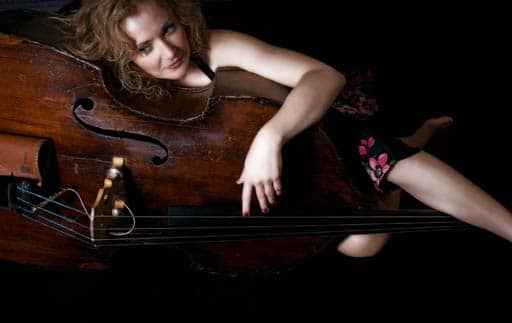
Nicki Parrott © Mary Jane Photography
Dueblin: What is it that made you finally choose Jazz, besides the first band with your sister Lisa Parrott?
Nicki Parrott: I like the fact that in Jazz every gig is different. The gigs I do in New York are totally different to what I do in Europe. I like this fact: every concert is fresh. I have also done Broadway pits, also on the piano, in the last couple of years. But this is not interesting enough for me to always play the same pit. I did that for the experience and to learn to work under a conductor. Another reason was the lack of improvisation in such orchestras. Improvisation is very important to me.
Dueblin: The classical flutist Dorothee Oberlinger talked in an interview with Xecutives.net about improvisation. She described how the improvisational character of the former baroque music changed to classical music that did not give space to improvisation anymore. It is the improvisational element of the Barock music, that attracts her so much. Is it the improvisation you like about Jazz?
Nicki Parrott: I think this is why I initially got very excited about Jazz music. I always liked classical piano and flute very much. I was playing in local orchestras in Newcastle when I was 16. But then I started playing for a band named „The Marching Koalas“. It gave me a lot of possibilities to play the flute and the piccolo. I went to Japan playing the piccolo with this formation – that was very exciting and I am very grateful for this experience.
Dueblin: Compared with Rock and Pop music and even classical music, Jazz has never attracted masses and bigger audiences. It was always a «Nische». You know all of those musical branches. How do you personally explain, why Jazz never expanded, except for the „roaring“ Twenties, Thirties and Forties?
Nicki Parrott: It is interesting, some days ago I accompanied my sister in New York to the Musician Union. My sister is a brilliant copyist. She has done copying work for the New York Pop Orchestra and several bands but also for me. To be a good copyist, you also need to be a good musician. So there was this room full of New York musicians talking about music. I saw Bernard Purdie, who played with Aretha Franklin, and Roberta Flack. Both are on millions of records. All the Broadway contractors and conductors were there – all the people of music in this big room. Basically the message that came from the stage was, that we were all very brave and this time to be musicians very tough. We are definitely in a time of transition going to digital and we do not know what is around the corner. It was also said, that Jazz was marginalized, also by the media, who are looking for more attractive music for a bigger audience. If you are lucky you can see somebody playing Jazz at the Grammy Awards. That is reality. Compared with Rock and Pop, Jazz is in a time of flux, still looking for its justification and entitlement.
Dueblin: What is the reason for that, in you opinion?
Nicki Parrott: That is very difficult to say. I have a lot younger people coming to my gigs. And they enjoy it. I personally also want to entertain. I think that is were people get confused, because they think they would not get entertained at a Jazz concert. But that is not true. I like musicians who are telling stories on the stage, stories that attract and that entertain, as well as playing great music.
But Jazz is a big world, like a huge umbrella covering lots of things. If you go to a Jazz festival these days you can hear that. Sometimes I personally listen to «Jazz» that I cannot get and that does not move me. So whether it is Jazz or Pop or Rock, music has to move me. One can say: «I do not like Jazz!» But the truth is, that it depends on the type of Jazz one is talking about. Therefore, people should search it out. It is probably not well enough promoted on the radio, so that people that do not go to festivals cannot search it out. Jazz is probably not too much for big audiences. If the atmosphere is bad, it is difficult to bring it over to the audience. But I have played for bigger audiences too, this year in Princeton. Everybody was there, the father, his kids and their grandmother: 3000 people in one room enjoying Jazz. Jazz musicians probably often go too intellectual, which is also often a cliché.
The music business generally is tough. I think lot of it is marketing, publicity, the right manager and the right place at the right time. For a lot of very good musicians, not only for Jazz musicians, it is difficult to get the gigs you are going for.
Dueblin: You have also played with many legends whose music is on millions of records. One of those music legends was Les Paul, a brilliant guitarist who also influenced the Rock business and musicians such as The Edge of U2 and Slash of Guns N’Roses but also Eric Clapton. Could you tell us a little bit about Les Paul and your work with him?
Nicki Parrott: Les Paul was a brilliant guitar player with big influence also on the Rock business. I played between 1999 till 2009 with him, until he died. That was a fantastic experience. He inspired me and I learned so much from him. We had those conversations a lot about Jazz and the music business. Les Paul also knew and realised that Jazz and the music business was in the state of flux. There is a big internet and computer wave splashing over the audience and you have to be much more marketing savvy now than 20 years ago. There is definitely less work around but lots of fantastic musicians. Especially in New York the level of great musicians is very high. But you need management and publicity to get through to the audience, it does not only depend on one’s skills. All those factors cost money and changed music business – like other businesses too. In such moments I think of younger talents, musicians with an incredible passion and enthusiasm, who have to deal with all of this. Look at that great Harlem Stride pianist Stephanie Trick from St. Louis (Missouri) who played in the old church of Boswil in Switzerland the other day together with me and some other Jazz musicians. She is 23 and so very talented. I enjoyed her concert a lot. People were cheering her on. I am very confident that she will make a great career and I wish her all the best. But I would not even know what to tell her if she asked me how to get along in the music business. „You have to learn how to be true to yourself and play the music that makes you feel great, regardless of the business.“ That is, what I would tell to somebody like her and that is what I have got from my mentors, such as Les Paul.
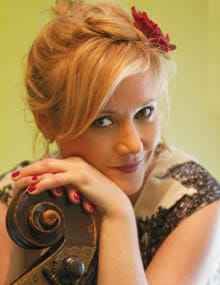
Nicki Parrott © Brian Wittman
Dueblin: How did it come about that you – a teenager back then in Australia – met the legendary bass player Ray Brown, the musician who was married to Ella Fitzgerald and also helped Diana Krall become a superstar?
Nicki Parrott: When I was 15 I went to a Jazz camp in Sydney and I met up all those musicians from Newcastle that were interested in Jazz. John Foreman and Adrian Mears were also there. We started to play in clubs. We were terrible but we had something that people recognised and attracted. The piano player was 13 and could not even reach the pedals. There was me and my sister Lisa giving our best. All five of us are now professional musicians. Adrian Mears is a great trombone player. He is professor at the Musikhochschule in Basel. He is a wonderful musician. Andrew Dickenson is one of the very best drummers in Jazz and still living in Sydney. John Foreman besides was the musician who wrote all the music for the Sydney Olympics. He was the musical director for daytime TV shows. Don Burrows and James Morrison were also looking at those kids at that time. Then, a couple of years later Ray Brown came to Australia. This was probably in 1989. I was following the gigs and I somehow found out where the legendary Ray Brown was staying. I think he had a day off and I called the hotel. I asked him if he could give me a bass lesson. He told me that he was on his way to play golf. I told him that I enjoyed seeing him playing. Finally he asked for my number. He apparently called James Morrison and asked if I was for real or just a freak (laughs). James Morrison must have said nice things about me, that I was really into the bass. Finally Ray Brown called me and asked me when I could be there. I said in an hour. That was fantastic (laughs). There was a lot of encouragement he conveyed to me. You get discouraged from time to time and it is wonderful if you get a kind of encouragement booster by somebody as famous and talented as Ray Brown.
Dueblin: This mentoring effect and behaviour like you had it from Les Paul, Ray Brown but also from Dick Hyman. What is it that you can get from such legends besides the encouragement and how do they deal with younger talents as you were and are?
Nicki Parrott: It is finally pure encouragement those legends can convey to somebody. It has nothing to do with age, sex or colour. It is just they see in you that you want to do this and they take you very seriously. With Les Paul it was interesting. The gigs with him were also shows and Les wanted me to sing from time to time. He turned around on stage and said: „Is this what you do, just playing this bass?!“ He laughed and got the audience in his pocket with such jokes. Then I said I would sing if he would want to have me sing. This show effect was terrific. We talked together on the stage and told stories in order to entertain the audience in a spontaneous way. Some people are great musicians and can make people laugh. This is a wonderful mixture I personally like very much. All this is also about life experience you get from those legends. Les was good at it and Jazz makes it possible. This is this life experience and freshness I love about Jazz. It also about hearing something moving. Bing Crosby and Judy Garland did that very professionally. Slash and Paul McCartney liked this too and their music experience is so different and so interesting. Keith Richards was also in the audience and I felt their tremendous respect towards Les Paul but also towards the band and me. So you see, the back stage was really the show for me.
Dueblin: To be a musician is not always easy. There are lots of difficult moments in a musician’s career. Are those mentors also able to help you to manage difficult situations?
Nicki Parrott: The wonderful thing about working with people like Les Paul or Dick Hyman is that they do not want to change you, they only want to guide you. I think that is wonderful and this is the best approach to leading a band. Therefore, you need a lot of trust. Les Paul always said to the band when he liked the concert. But if he did not like it, he would not say much. He knew that the band knew on its own, that something went wrong or was not perfect. I want to say with this, that he would have never spread discouragement. He always guided and accepted other’s judgements. But finally he took the decisions.
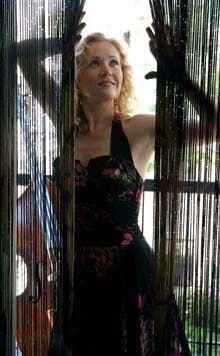
Nicki Parrott © Mary Jane Photography
Dueblin: What is different between playing in New York, for instance, and playing in Switzerland or Germany?
Nicki Parrott: Oh, the audience here in Switzerland is fantastic. There are a lot of fans and lots of smiles. Sometimes I ask myself, if a musician can ask for more than a smile. It is so simple, but it is wonderful, having people in front who give you a smile while you are playing. It is a kind of respect and it keeps you going. It makes up for all the bad experiences in a musician’s life.
There is a difference between European and American audiences. Both respond to good performances. They know if there is electricity in the air and they enjoy it. The audience feels when the musicians are enjoying themselves. That is universal. If the musicians give everything they have and a certain atmosphere arises, which is a kind of magic. It is difficult to verbalize that feeling. I had those feelings here in Switzerland too. New York audiences are tougher. If they do not like something, they complain. I have never seen somebody coming to a musician in Switzerland or in Europe in general who says: „You are awful!“ Things like that can happen in New York. It also happens that people criticize you and they tell you after the concert, what you should do better. Recently somebody told me something about New York people that made me smile: «New York people have always two businesses: Theirs and Show business.“ (laughs). I think this is a little bit true but this also makes the New York audience a great audience. But it is definitely more difficult than in Europe to take risks and chances.
Wonderful in Europe in my experience is to see how people appreciate music generally. I was playing electric bass with David Krakauer. His audience in the US is quite small but is very big in France. Sometimes it is hard to get an audience in the US for a new approach or a new idea. I have the feeling that the European audience is more open for new approaches to music.
Dueblin: What do you wish for the music business, yourself and younger music talents?
Nicki Parrott: I played in the last 22 years in Australia and in New York. Within the musicians I played with I asked myself very often, why is this and that one not a star. Some of them are major talents. I put my hands in the air and I could not give an answer. The business can be crushing. Sometimes it works harmoniously. But in other moments musicians do not get paid and are treated very badly. I would like to see more deserving and play in other places on earth. I also wish that deserving talents would get their recognition. I hope that people with talent can get their success with their talent and not with other means. I hope to see that music speaks for itself and that people who are talented get their opportunities. As most musicians you have to believe that there is a place in this world you fit in. The distraction with computers is huge, nobody has time to visit a museum or to read a book anymore. It is not an easy world at the moment. Going to a museum und reading a book I feel human again and feel part of the human race. Besides it is absolutely proven that people in music and in the arts do better in education. That is why I also support younger talents and try to encourage them to go on with an instrument.
Dear Ms. Parrott, thank you very much for giving your time for this interview. I wish you much success for your concerts, good audiences and successful musical projects. We are looking forward to hearing you soon in Europe and Switzerland!
(C) 2010 by Christian Dueblin. All rights reserved. Other publications require the author’s explicit consent.
______________________________
Links
– Homepage
– Youtube
More interviews about piano music and composing – with pianists and other musicians:
- Jon Lord about composing, his music career and the developments in the music industry
- Chi Coltrane about her comeback, about other music legends and the secrets of the music business
- Hazy Osterwald about the beginnings of his career, his love of jazz and the changes in music during and after World War II
- Dick Hyman about playing the piano, jazz and life
- Giovanni Antonini about his musical career, authentic performance practice and his approach to conducting


